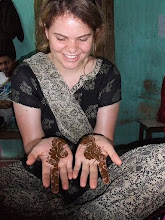Dear dedicated reader,
As the school year starts up in the US, I continue to trudge through the utterly dull and lifeless Gujarat state English curriculum with my school-day classes here in Kadod. This most recent episode will highlight a typical teaching interaction:
Me: Okay students, today we will be doing dialogue writing. I will write a dialogue on the board, and you will copy it into your essay notebooks. Understand?
Students: Yes, ma’am.
[Some students still look confused. Tabussum tells them in Gujarati to take out their essay notebooks.]
[Students take out their essay notebooks. One student raises his hand and I call on him.]
Student: Teacher, can I copy this essay in a black pen?
Me: It makes no difference to me. Copy it in whatever color you like.
Tabussum: [interjects] No! You must copy it in a blue pen!
Student: Yes ma’am. [searches to find a blue pen in his backpack].
Fin.
Truly inspiring, is it not?
Meanwhile, the other aspect of the Foundation’s work here in Kadod, before and after school Spoken English classes, have easily become the highlight of my day. With a small class size, (mostly) cooperative, motivated students and license to do whatever fun, interactive activities I want, how could they not be?
The focus of Spoken English class is, unsurprisingly, on goading the students into actually speaking this language that they pretend to learn during the school day. While some of the 9th grade and 11th grade sections have quite strong reading, comprehension and writing skills, the ability to actually communicate in this language is still very low for almost all the students across the board.
Melissa and I have decided that the best way to learn to speak is to practice practical situational English and gain confidence in the sentence patterns that you actually use on a daily basis to get things done. Luckily, no one is more familiar with what basic sentence patterns these are than Melissa and I who have to struggle through using them in Hindi on a daily basis ourselves.
Our inaugural unit has been on travel, a theme that is easy for the students to get excited about. However, I found myself working in some unexpected (but somehow, typically Indian) vocabulary into our most recent lesson on purchasing a railway ticket.
The object of the lesson was for students to feel confident in how to buy a railway ticket, including asking how long the journey would take (a surprisingly idiomatic English expression), how much the tickets would cost and how many tickets they would need. The students were to write a dialogue about buying a railway ticket and then perform it for the class. The following two dramas resulted:
Group 1:
Ticket Seller: How can I help you?
Traveler: I would like to go to Jaipur
Ticket Seller: How many tickets do you need?
Traveler: I need 5 tickets.
Ticket Seller: That will be Rupees 5000.
Traveler: 5000! The posted price is only Rupees 2500! That 2500 will go in your pocket! I will report you to the Indian Railway Authority.
Ticket Seller: Oh no Sir! Please do not! I will…
The student speaking broke off at this point and looked at me. “How do you say “nikalna dena” in English, teacher?” He asked.
“To be fired,” I replied with a smile. He continued.
Ticket seller: I will be fired! I will give you the tickets for Rupees 2000.
Traveler: Okay, I will not tell. Give me the tickets.
Ticket seller: Don’t tell! Oh thank you sir.
Fin.
This was an excellent dialogue; however, even more funny to me was the one that followed it:
Group 2:
Ticket Seller: How can I help you?
Traveler: I would like to go to Delhi.
Ticket Seller: I have no tickets to Delhi. There is a waiting list.
Traveler: Oh please sir! I must go to Delhi! I will give you Rupees 3000 for one ticket!
Ticket Seller: Oh! Blackmail!
I broke in at this point, my vocabulary correction radar on high. “Actually, I think the word you want is bribe,” I suggested. I wrote the word on the board.
“Bribe, ma’am?”
“Uh, yes, when you want someone to do something for you so you offer them a lot of money – this is a bribe.”
He nodded and continued.
Ticket seller: Oh! A bribe! All right, I will sell you this ticket.
Traveler: Oh thank you!
Fin.
Afterwards, I kicked myself. How could I have forgotten these culturally appropriate ways of solving problems when I made up my vocabulary list? It must have just slipped my mind…
Best,
Cat
Subscribe to:
Post Comments (Atom)




2 comments:
love it :) absolutely. fortunately, money speaks for itself and you don't need NEED to know the word for "bribing" but it can't hurt. lots of love, michael
That was hilarious. When did your life become scenes from a charming indie film?
Post a Comment